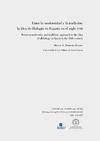Identificador persistente para citar o vincular este elemento:
https://accedacris.ulpgc.es/handle/10553/77280
| Campo DC | Valor | idioma |
|---|---|---|
| dc.contributor.author | Perdomo Batista, Miguel Angel | en_US |
| dc.date.accessioned | 2021-01-20T16:16:54Z | - |
| dc.date.available | 2021-01-20T16:16:54Z | - |
| dc.date.issued | 2020 | en_US |
| dc.identifier.issn | 1131-9879 | en_US |
| dc.identifier.other | Scopus | - |
| dc.description.abstract | Una aproximación a la idea de filología en España en el siglo xviii revelará que, durante la centuria, no hubo una, sino varias filologías: la filología humanista de tradición clásica, la historia erudita (o erudición histórica) de filiación barroca, la erudición crítica de los novatores, la de influjo racionalista y la de influjo empirista, que alcanzó su cima en la obra de Juan Andrés. Nos proponemos mostrar cómo las nuevas tendencias conviven y se entremezclan con otra no menos importante: la tradición. Y en este sentido, es preciso señalar que durante esta centuria se produce el deslinde definitivo entre Historia y Filología, y que esta última se repliega sobre sí misma a partir de la consolidación de la Historia Literaria y la Historia Literaria Comparada. Finalmente, reflexionaremos sobre el estatuto de la Filología en relación con el propio movimiento ilustrado, es decir, respecto a su contribución u oposición a las nuevas ideas. | en_US |
| dc.description.abstract | An approach to the idea of philology in Spain in the 18th century will reveal that, during the century, there was not one, but several philologies: the humanist philology of classical tradition, the erudite history (or historical erudition) of baroque affiliation, the critical erudition of the novatores, that of rationalist influence and that of empiricist influence, which reached its peak in the work of Juan Andrés. We propose to show how the new tendencies coexist and intermingle with another no less important one: tradition. And in this sense, it is necessary to point out that during this century there is the definitive demarcation between History and Philology, and that the latter withdraws into itself from the consolidation of Literary History and Comparative Literary History. Finally, we will reflect on the status of Philology in relation to the Enlightenment movement itself, that is, in relation to its contribution or opposition to new ideas. | en_US |
| dc.language | spa | en_US |
| dc.relation | ESCENARIO GALDÓS. Textos, pensamiento y escenarios de Benito Pérez Galdós. | en_US |
| dc.relation.ispartof | Cuadernos de estudios del siglo XVIII | en_US |
| dc.source | Cuadernos de Estudios del Siglo XVIII [ISSN 1131-9879], n. 30, p. 469-483 | en_US |
| dc.subject | 550510 Filología | en_US |
| dc.subject | 55 Historia | en_US |
| dc.subject.other | Filología | en_US |
| dc.subject.other | Historia | en_US |
| dc.subject.other | España | en_US |
| dc.subject.other | Siglo XVIII | en_US |
| dc.subject.other | Juan Andrés | en_US |
| dc.subject.other | Philology | en_US |
| dc.subject.other | History | en_US |
| dc.subject.other | Spain | en_US |
| dc.subject.other | 18th century | en_US |
| dc.title | Entre la modernidad y la tradición: la idea de filología en España en el siglo XVIII | en_US |
| dc.title.alternative | Between modernity and tradition: approach to the idea of philology in Spain in the 18th century | en_US |
| dc.type | info:eu-repo/semantics/article | en_US |
| dc.type | Article | en_US |
| dc.identifier.doi | 10.17811/cesxviii.30.2020.469-483 | en_US |
| dc.identifier.scopus | 85179735198 | - |
| dc.contributor.orcid | NO DATA | - |
| dc.contributor.authorscopusid | 57211000795 | - |
| dc.identifier.eissn | 2697-0643 | - |
| dc.description.lastpage | 483 | en_US |
| dc.identifier.issue | 30 | - |
| dc.description.firstpage | 469 | en_US |
| dc.relation.volume | 2020 | en_US |
| dc.investigacion | Artes y Humanidades | en_US |
| dc.type2 | Artículo | en_US |
| dc.utils.revision | Sí | en_US |
| dc.date.coverdate | Diciembre 2020 | en_US |
| dc.identifier.ulpgc | Sí | en_US |
| dc.contributor.buulpgc | BU-HUM | en_US |
| dc.description.fecytq | Q4 | - |
| dc.description.fecytpuntuacion | 16,98 | - |
| dc.description.dialnetimpact | 0,0 | - |
| dc.description.dialnetq | Q3 | - |
| dc.description.dialnetd | D7 | - |
| dc.description.erihplus | ERIH PLUS | - |
| item.fulltext | Con texto completo | - |
| item.grantfulltext | open | - |
| crisitem.author.dept | GIR Investigaciones literarias y lingüísticas en español | - |
| crisitem.author.dept | Departamento de Filología Hispánica, Clásica y de Estudios Árabes y Orientales | - |
| crisitem.author.orcid | 0000-0002-5019-2368 | - |
| crisitem.author.parentorg | Departamento de Filología Hispánica, Clásica y de Estudios Árabes y Orientales | - |
| crisitem.author.fullName | Perdomo Batista, Miguel Angel | - |
| crisitem.project.principalinvestigator | Márquez Montes, Carmen | - |
| Colección: | Artículos | |
Visitas
125
actualizado el 11-may-2024
Descargas
154
actualizado el 11-may-2024
Google ScholarTM
Verifica
Altmetric
Comparte
Exporta metadatos
Los elementos en ULPGC accedaCRIS están protegidos por derechos de autor con todos los derechos reservados, a menos que se indique lo contrario.
